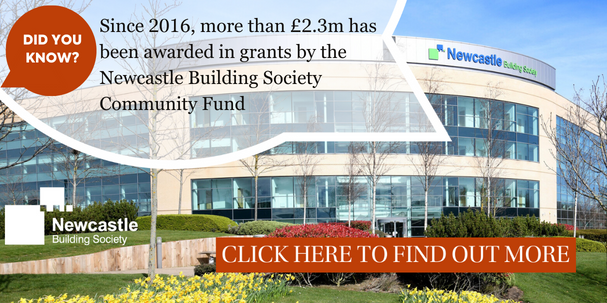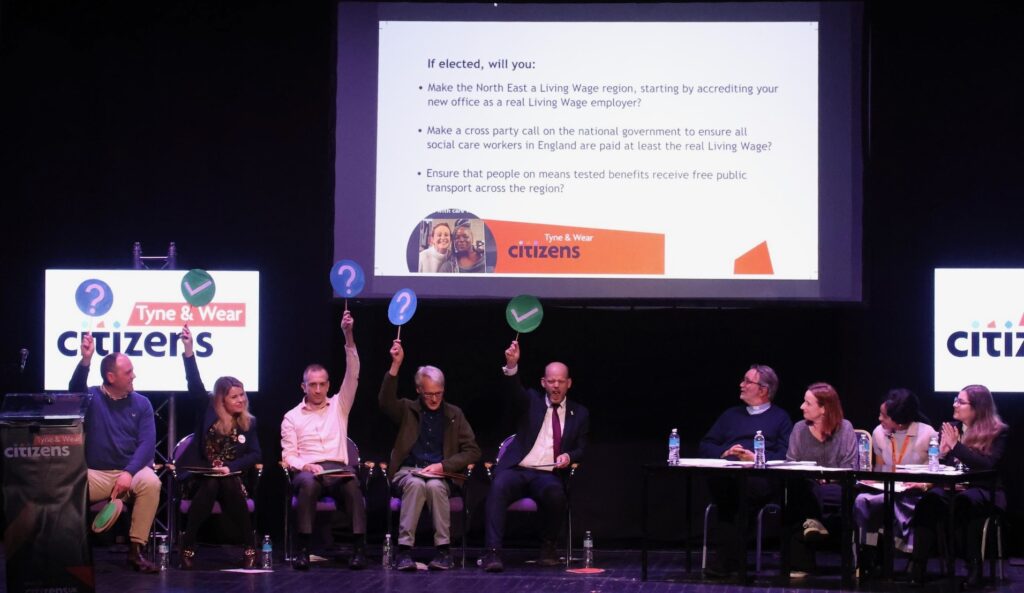
Every politician’s nemesis: the ordinary voter.
For our elected representatives, there’s no higher stakes moment than a conversation out in the wild. On such interactions are elections won and lost, and careers made or destroyed.
There’s a long history of things getting ugly.
In 1880, Joseph Cowen Jr, the founder of the Tyne Theatre, owner of the Newcastle Chronicle and then MP for Newcastle, was crushed and seriously injured in an incident at a meeting with his electorate.
There was thankfully no risk of that at the venue he built on Monday night, when Tyne and Wear Citizens convened probably the most polite and well-mannered audience of the North East mayoral race so far.
There was, however, a procession of ordinary people from the region’s community organisations, sharing testimony from their lives and work, while the candidates were in the unfamiliar position of sitting and listening, rather than speaking.
Tyne and Wear Citizens’ Mayoral Assembly — they were at pains to make clear it was not a politically-driven hustings — put specific asks to candidates, and asked them to respond via coloured paddle: Yes, No, Maybe.
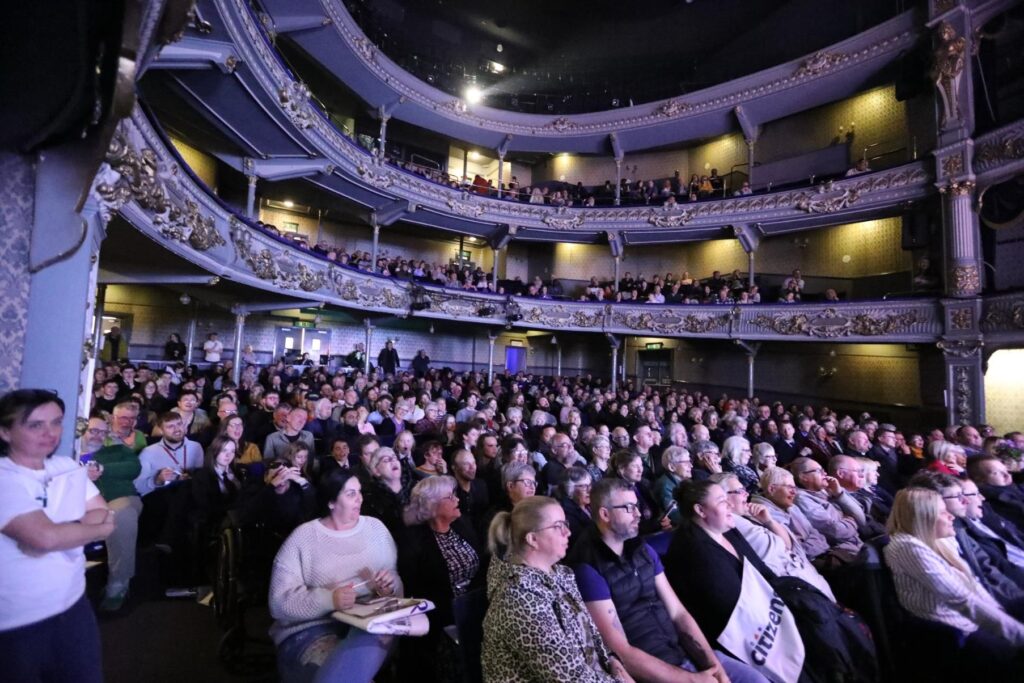
Those looking for divisions in the policy platforms would have been disappointed, as the five candidates on the stage — Reform UK’s Paul Donaghy was not present — largely agreed on what the region needed.
Labour’s Kim McGuinness and independent Jamie Driscoll gave universal support to all of the proposals, which were drawn from a community listening exercise. They covered ground including making the North East a living wage region, building more affordable housing and tackling racial injustice and poor mental health in the region’s schools.
The only partial dissent came when Conservative Guy Renner-Thompson, Lib Dem Aidan King and Green Andrew Gray all gave a proposal for free public transport for those on means-tested benefits a Maybe, citing the cost.
I will give my consent to any government which does not deny a man a living wage. Or woman!
Jamie Driscoll
Driscoll’s response at the lectern on that proposal seemed to fall into the Maybe category too, as he added caveats around national operators. At crunch time he appeared to consider raising the ‘?’ Maybe paddle, only to then opt for the big green tick to match McGuinness.
So, there was nothing in the formal proceedings to separate the two perceived frontrunners in the race, but there was another divide on show — between protest and policy.
Where Driscoll’s responses tended towards protests and picket lines, McGuinness’s tended towards policy.
With the candidates each given two minutes every time they stood at the microphone, they did have a little time to roam around the topics.
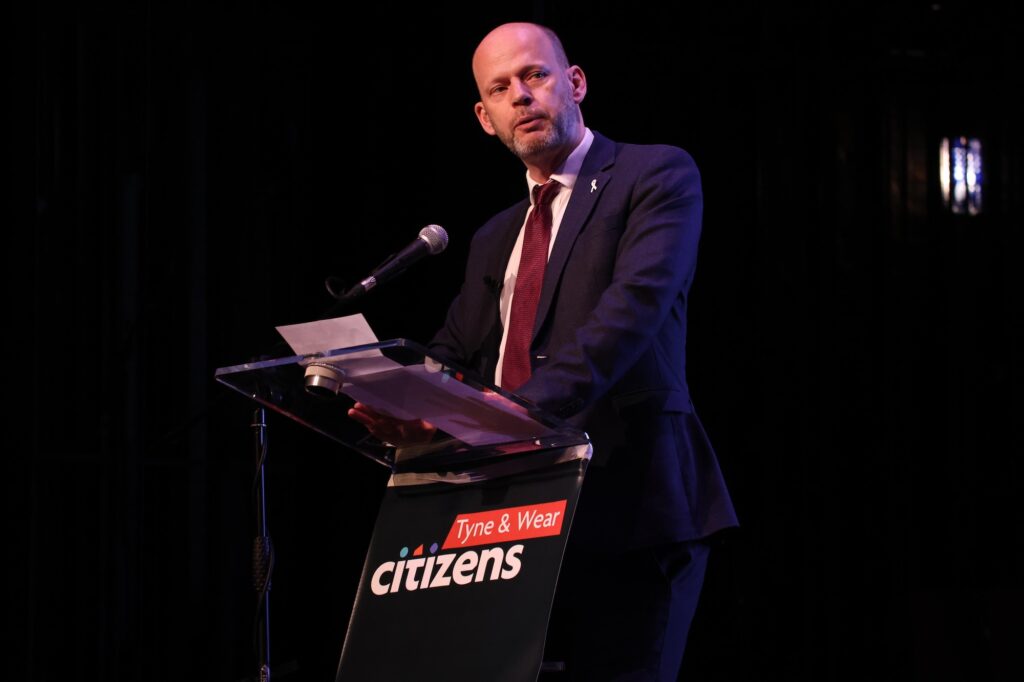
McGuinness often uttered the words ‘go further’ in her slots, making use of a political equivalent the old improv comedy staple of ‘yes, and…’ to set out her platform.
Asked about the living wage for social care workers, she said yes and…better childcare provision. On a voluntary charter for private sector landlords, she said yes and…the power to seize property from poor ones. On counsellors in schools she said yes and…the return of Sure Start centres with an expanded remit to support families and teenagers.
In contrast, Driscoll, while he did reference policies like the North of Tyne’s Bright Start programme, a planned youth voice scheme for the region and licensing for landlords, leaned heaviest on the politics of protest.
On the ask around counsellors in schools, he responded by talking about joining striking teachers on the picket line.
Responding to another ask, about funding research into racial injustice in education, Driscoll spoke about joining anti-racism protests and elicited the largest crowd response of the night by voicing his support for Palestine.
Each one a noble cause, certainly, and his commitment laudable, but these are not things specific to the powers of the North East mayor. Instead they were lines designed to get the audience hollering.
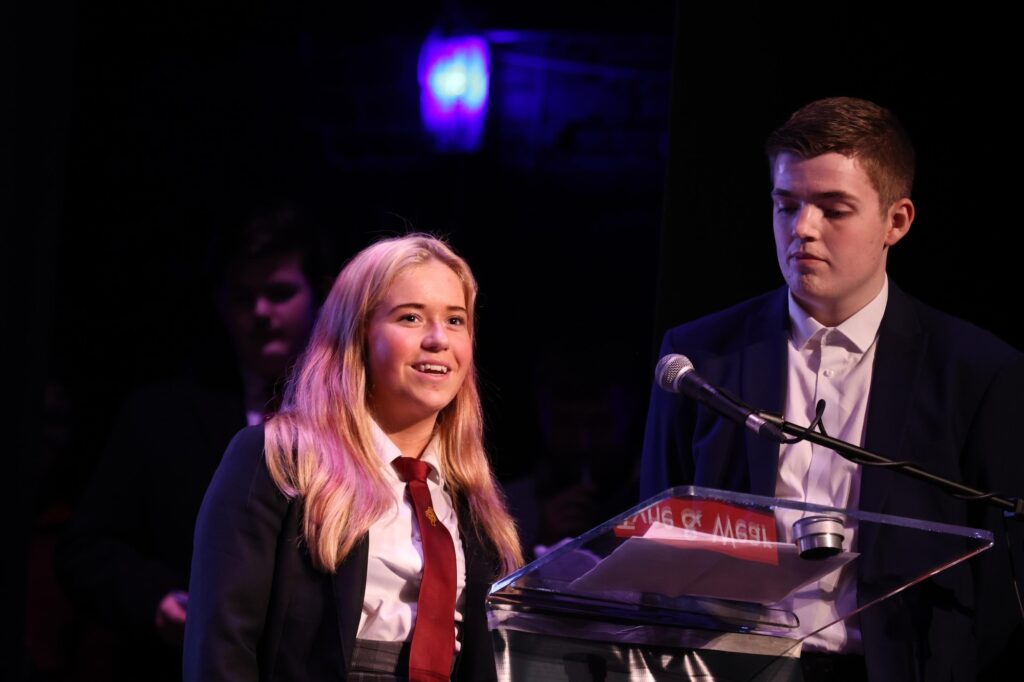
Tyne and Wear Citizens is non-partisan, but had a section of the audience arrived with their minds already made up?
The crowd reaction to Driscoll, no doubt honest in its intent, felt performative in its volume on two or three occasions. The whistling and whooping which greeted him was absent from the response to equally impassioned words from the other candidates.
This was most notable when Lib Dem candidate Aidan King, an NHS doctor when he’s not running for office, recalled the number of elderly people he’d seen admitted to hospital as the result of the cold and damp of poor quality housing.
King called the 96 new homes for social rent built in the North East last year as a ‘failure, failure, failure’.
- Read more: Cultivating an award winning career
- Read more: Newcastle is a major player in law
If it is a failure, then it’s one which happened at least partially on Driscoll’s watch. As North of Tyne mayor since 2019, he’s had oversight and influence on a number of housing and land development initiatives.
However, the format of the evening meant candidates weren’t challenged on their records, and neither Driscoll’s time heading North of Tyne nor McGuinness’s five years as Police and Crime Commissioner faced any real scrutiny.
Those records have become a key, somewhat sour battleground as the campaign enters its final week.
In a recent campaign video, Driscoll sought to pin the blame for poor crime statistics squarely on McGuinness while claiming the creation of thousands of jobs as his own. Don’t vote for a party, the video says, vote for competence.
A fine enough position in theory for an incumbent mayor, but does it stack up? On a couple of occasions on Monday evening, when discussing issues around pay and working conditions, his record looked a little thin.
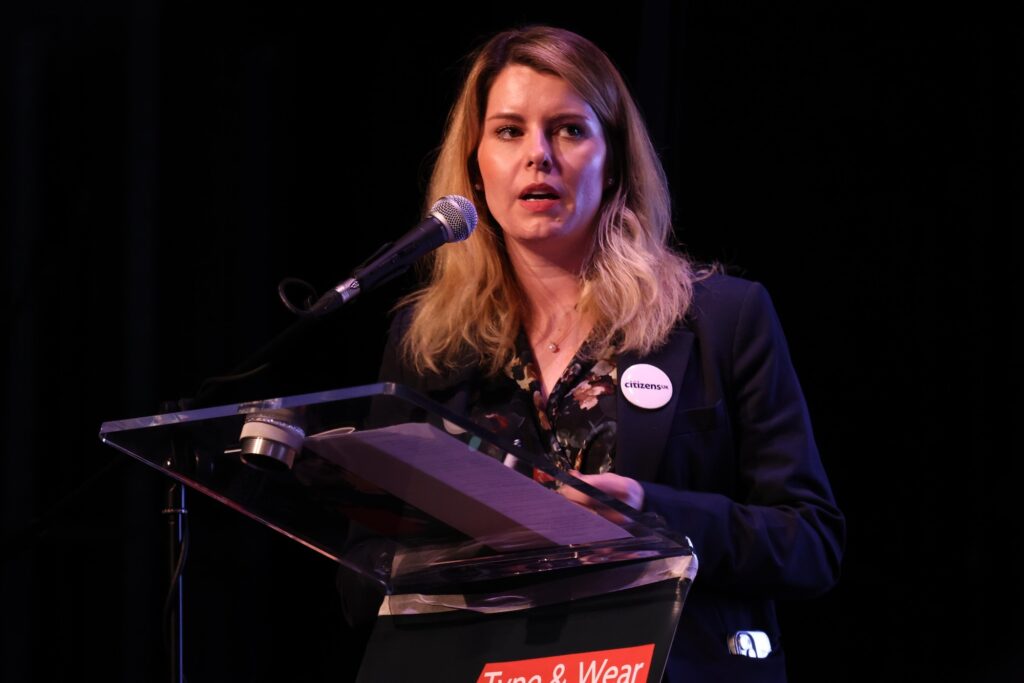
Rather than speak to the more than 800,000 people he currently represents, Driscoll instead referenced the North of Tyne Combined Authority itself, which is an organisation of fewer than 100 employees.
As with the talk of protests and pickets, it is noble stuff, but lacking the scale of impact you’d expect from a regional mayor.
There was, therefore, some irony in Driscoll’s dismissal that we will hear lots of empty platitudes during the campaign, given the well of competence he’s attempting to draw from appears to swiftly run dry.
You’d have every right to expect a five-year mayor, even with the disruption of the pandemic, to have more tangible successes to point to.
Therein lies the rub.
Is his record in office sufficiently strong to evidence his ability to translate campaign poetry into policy prose? On Monday’s showing, he’s not especially good at either.
Presented with an opportunity to talk about making the North East a living wage region, Driscoll quoted Billy Bragg. “I will give my consent to any government which does not deny a man a living wage,” he said, before an Alan Partridge-esque addendum: “Or woman!”
Call up the craftsmen, bring me the draftsman, build me a path out of this awkward theatre.
It continued. “Home is not a noun, it’s an emotion,” he said later, on rental housing. That emotion is, presumably, confusion.
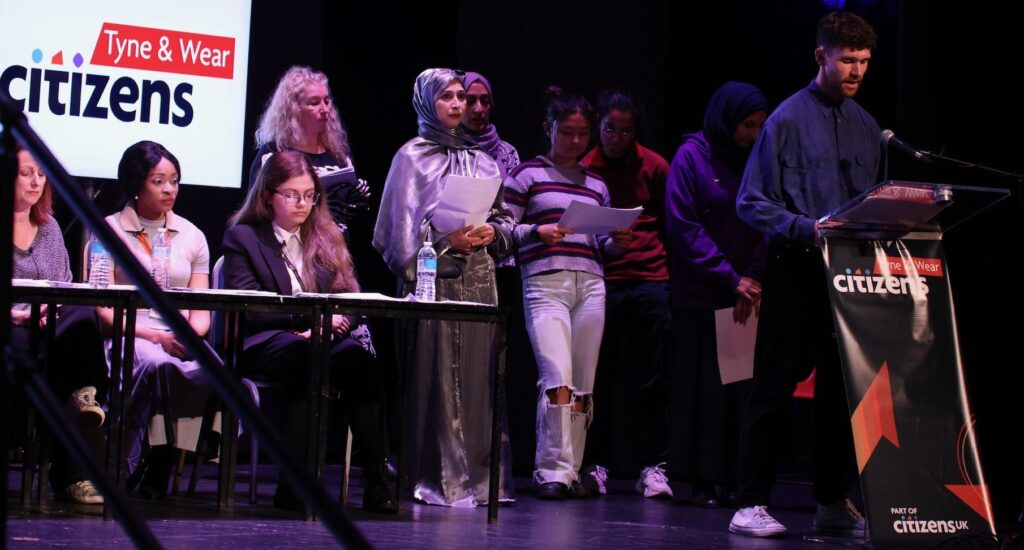
Tortured campaign poetry aside, Driscoll’s main pitch to voters, alongside his record, is his newfound independence.
As a Labour candidate, his election as North of Tyne mayor was the crest of the wave of Corbynism. But that wave has long since broken and rolled back, and his independence now could equally accurately be termed isolation.
There was some symbolism of this otherness in the manner of his arrival, hands in pockets, more than ten minutes after the event had started, and in his decision to take a seat on the front row, rather than the one reserved for him where the other candidates were patiently waiting.
The candidates were in the unfamiliar position of sitting and listening, rather than speaking
Arlen Pettitt
This separation he presents as a virtue sits out of step with the nature of the mayoral role.
McGuinness at one point spoke of her desire to see the functions of the Job Centre devolved, in order to remove DWP’s sanctions scheme in the region. To do so, she said, she’d work with what she hoped would be a Labour government.
Could Driscoll carry out such negotiations now, when he has fallen out so spectacularly with the leadership of the party he represented when he came to office?
How much, too, could he achieve locally heading a cabinet formed of mostly Labour council leaders, and surrounded by mostly Labour MPs?
The art of getting things done lies in the act of bringing people together.
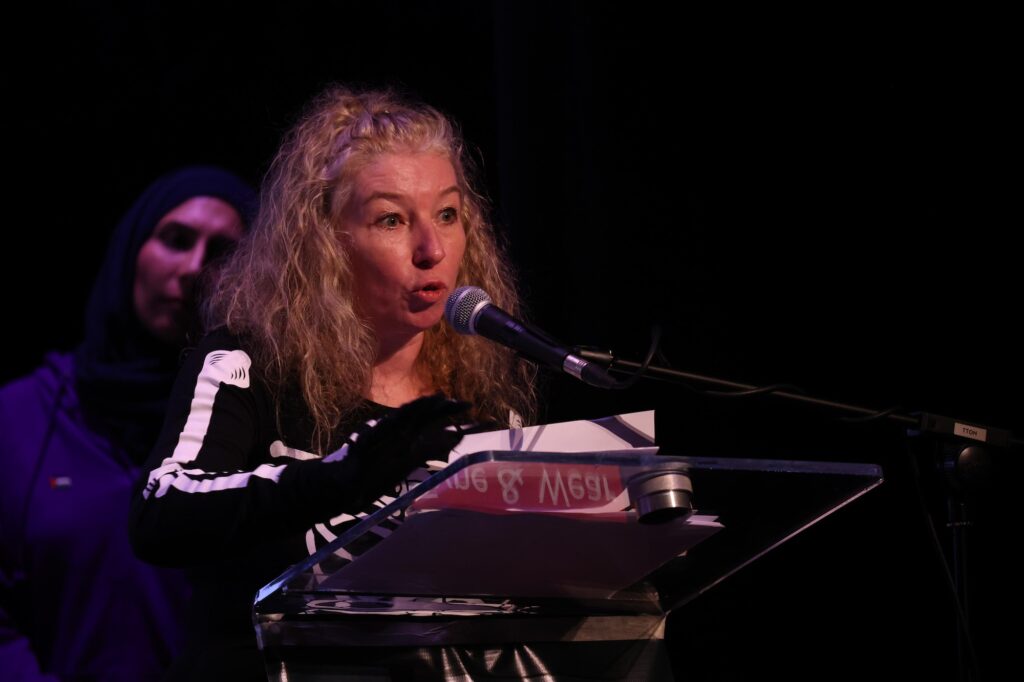
The role of regional mayor is not, on paper, that powerful. The Combined Authority cabinet members hold the portfolios on things like the economy, skills and culture, and the council officers do the doing.
The mayor themselves steers the agenda and takes responsibility, but their real value is as the soft power merchant and the bridge builder.
How McGuinness would fare is an unknown, especially when it comes to building a national profile, but being part of a national party structure gives her a leg up.
It beats pointing to your biggest bridge and boasting about how comprehensively you’ve burnt it.
Voters want change, but they also want authenticity and pragmatism.
The question is what change looks like. Is it standing with protestors, pointing out the problems, incisively and passionately? Or is it listening and responding, and making good, locally-driven policy?
Next week we’ll find out what voters think.
Whoever they choose, the new mayor will have at least one meeting already in their schedule, with Tyne and Wear Citizens, to pick up on the set of pledges they made on stage.
It’s a start.
